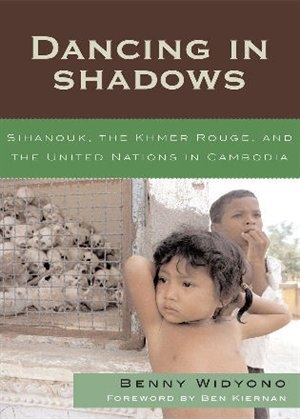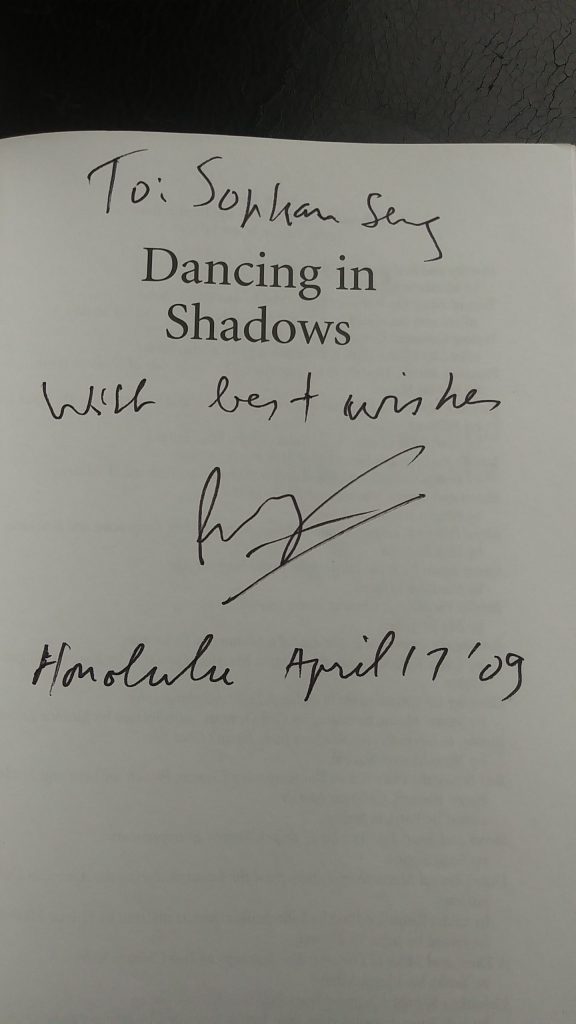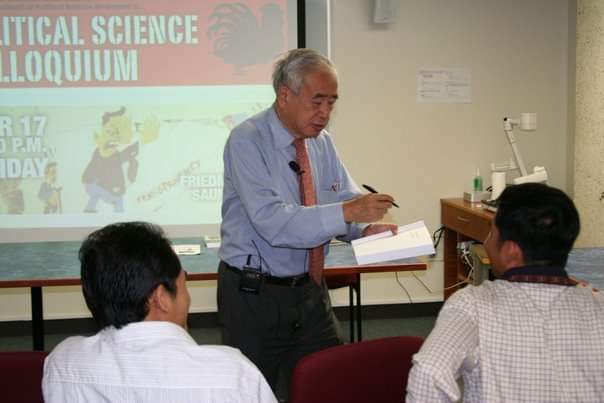
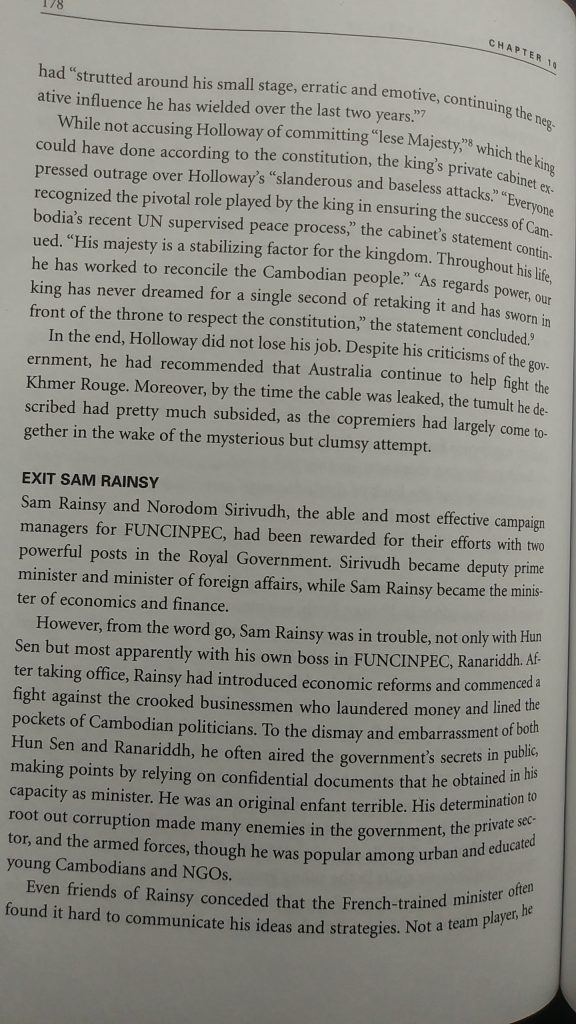
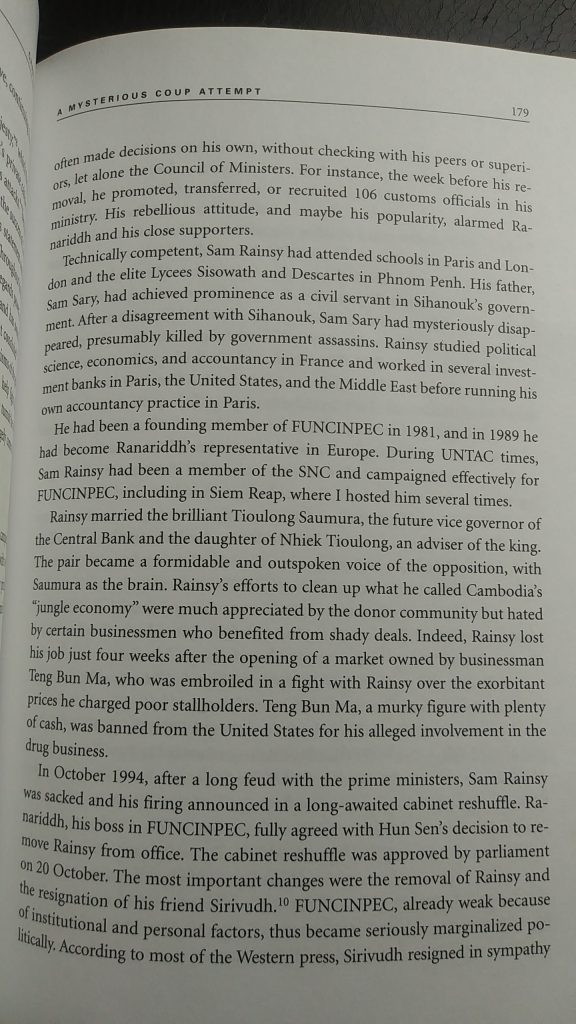
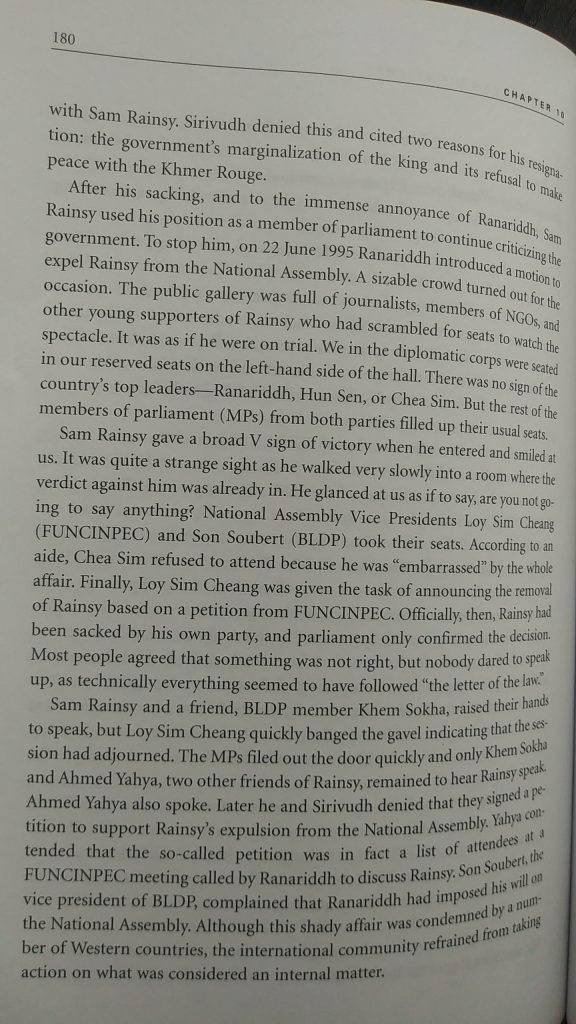
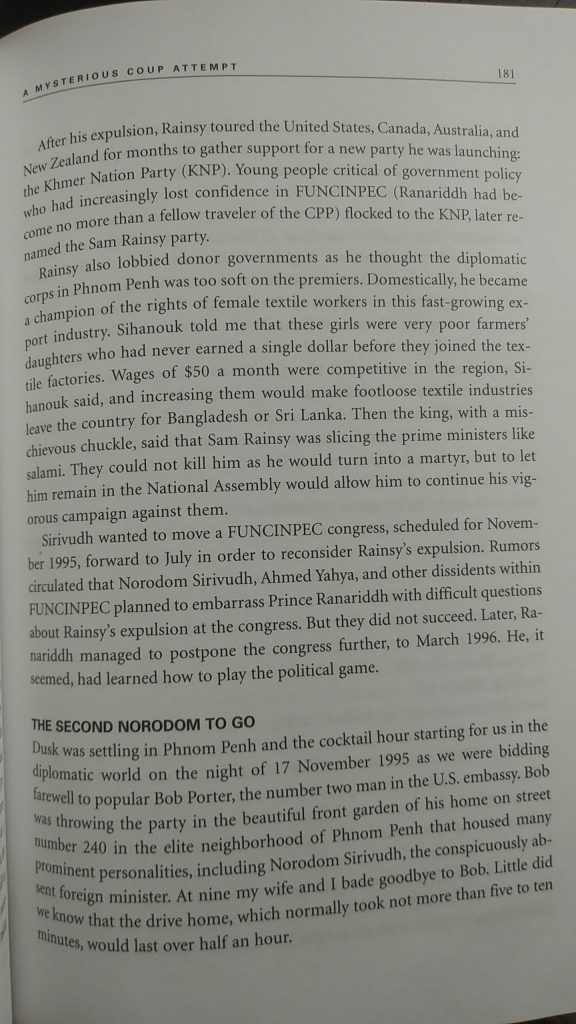
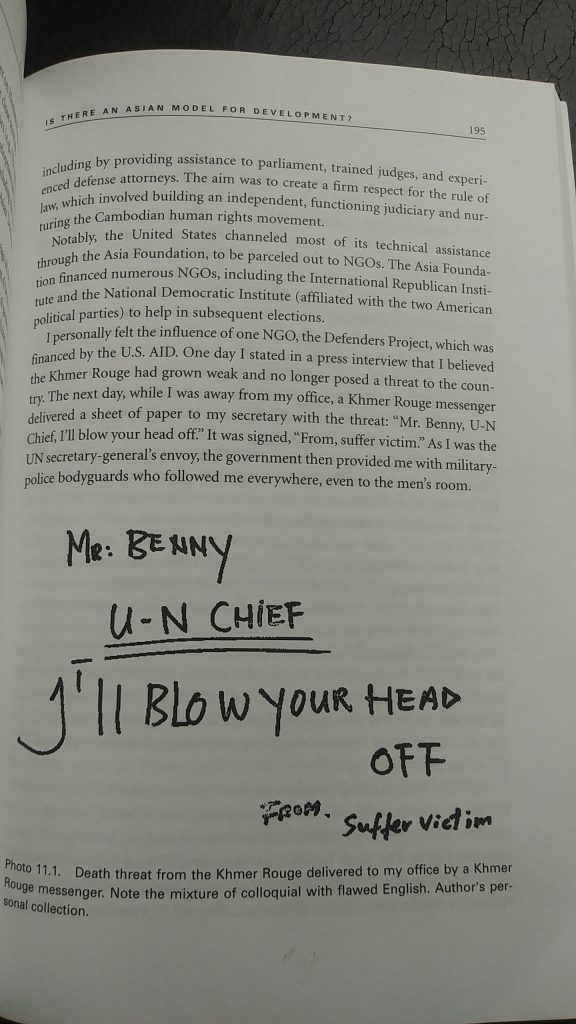
ថ្ងៃនេះខ្ញុំសូមសំដែងនូវសេចក្តីសោកស្តាយនិងចូលរួមកាន់មរណៈទុក្ខដល់ក្រុមគ្រួសារនិងញាតិមិត្តលោកបណ្ឌិត Benny Widyono ដែលបានលាចាកលោកនេះកាលពីខែមីនា ១៦ ឆ្នាំ២០១៩។ លោកធ្លាប់ជាលេខាប្រចាំប្រទេសកម្ពុជារបស់អគ្គលេខាធិការអង្គការសហប្រជាជាតិក្នុងសម័យអ៊ុនតាក់ UNTAC។
តែអ្វីដែលខ្ញុំចង់លើកមកបង្ហាញគឺវគ្គមួយក្នុងសៀវភៅដ៏ល្បីរបស់លោក រាំក្នុងស្រមោល Dancing in Shadow ក្នុងទំព័រទី១១៨ដល់១៨១ គឺការដែលល្បិចនយោបាយឌីហ្វីត DIFID (Divide, Isolate, Finish, Integrate, Develop) របស់លោកហ៊ុនសែនក្នុងការប្រឡេះលោកសម-រង្ស៊ីនិងទ្រង់សិរីវុឌចេញពីហ៊ុនស៊ិនប៊ិចដែលធ្វើអោយបក្សមួយនេះចុះខ្សោយដល់សព្វថ្ងៃ។ តែអ្វីដែលសំខាន់ពេលនោះគឺមានកឹម-សុខាម្នាក់ដែរ ក្នុងតំណែងលោកជាសមាជិកសភាពីគណបក្សព្រះពុទ្ធសាសនាដើម្បីអភិវឌ្ឍន៍របស់លោកតាសឺនសានបានជំទាស់ក្នុងការបណ្តេញលោកសមរង្សុីចេញពីសភាទាំងបំពានច្បាប់នេះ។ ដូច្នេះគោលការណ៍សមរង្សុី-កឹមសុខាជាមនុស្សតែមួយនៃគណបក្សសង្រ្គោះជាតិបច្ចុប្បន្នពិតជាឆ្លុះបញ្ចាំងឧត្តមគតិរួមរបស់អ្នកទាំងពីរកាលពី២៧ឆ្នាំមុន។
រៀបរៀងអត្ថបទដោយលោកសេង សុភ័ណ
Today, I would like to express deep sadness and share condolence with family and friends of Dr. Benny Widyono who passed away this March 16, 2019. He was the key secretary and UN’s official during UNTAC in Cambodia.
But what I am most impressed is his book “Dancing in Shadow” in page of 118-181 illustrating the political tactic of Hun Sen’s DIFID (Divide, isolate, finish, develop) to divide and isolate Sam Rainsy and Prince Sirivudh which has weakened FUNCIPEC ever-since. But the most exotic memoir is Kem Sokha who was MP from Buddhist Development Party of Sen San stood up to protest in the parliament for this illegal act of expelling Sam Rainsy from the Parliament and stripped off his Parliamentary impunity. So, the principle of Sam Rainsy-Kem Sokha is ONE of modern CNRP has been historically identical of their ideal since 27 years ago.
Original source for your reference: UH Press
Alvin Lim
Benny Widyono’s Dancing in Shadows
Book Review, University of Hawai!i
AUTHOR BIOGRAPHY
Alvin Lim is a Ph.D. student in Political Science at the University of Hawai‘i. Lim received his B.A. (Hons) and M.A. from the National University of Singapore, and taught Philosophy for three years at Pannasastra University in Phnom Penh, Cambodia.
Widyono, Benny. (2008). Dancing in Shadows: Sihanouk, the Khmer Rouge, and the United Nations in Cambodia. New York: Rowman & Littlefield.
Benny Widyono’s gripping!Dancing in Shadows is a memoir of his peacekeeping and diplomatic work in Cambodia: in 1992-93 he served as the United Nations Transitional Authority in Cambodia’s (UNTAC) Provincial Director of Siem Reap; subsequently in 1994-97 he served as the UN Secretary-General’s Political Representative to the Royal Government of Cambodia (2008, p. xxvii).
Dancing in Shadows begins on an unexpected note with! Ben Kiernan’s foreword that focuses on the role of Indonesians in resolving the Vietnamese occupation of Cambodia, paving the way for UNTAC. Kiernan notes a July 1980! meeting at Phnom Penh’s! Noor Al-Ihsan mosque between Cham genocide survivors and!Indonesian journalists. Their pioneering reportage triggered a change in Indonesian policy towards Cambodia which eventually led Indonesia to guide the warring Cambodian factions to reach a peace settlement (ibid., pp. xvii-xxiv).
This largely unknown thread of Cambodia’s tortured recent history nicely introduces the role of Widyono, himself an Indonesian citizen; for the key Indonesian role in the Cambodian peace process is also reflectedn Widyono’s subsequent participation in UNTAC. The Indonesian-Cambodian connection does not end there: Kiernan (ibid., p. xix) and Widyono (ibid., pp. 23-24) both note Indonesia’s and Cambodia’s mirrored experiences with politicide and genocide. This tragic mirroring is not just an academic observation for Widyono, as his ethnic Chinese heritage subjected him and his family to General Suharto’s anti-Chinese policies (ibid., p. xxix).
The key contribution of Dancing in Shadows is found in Widyono’s critique of the Cambodian peace process. Unlike other academics, he was actually part of UNTAC’s top administration, and enjoyed a privileged perspective of the mission’s ultimate failure in Cambodia. In Widyono’s view, UNTAC’s ultimate failure stemmed from two significant flaws in the 1991 Paris Agreements. First, the Agreements legitimized Pol Pot’s genocidal Khmer Rouge faction; second, the Agreements downgraded the status of Hun Sen’s្្ State of Cambodia (SOC) regime, disregarding its extensive administrative and military control over most of Cambodian territory (ibid., p. 35). These problems would adversely affect UNTAC’s subsequent performance. Not only did the Khmer Rouge pose a significant military challenge to UNTAC; UNTAC also found itself incapable of asserting its nominal authority over the SOC’s apparatuses of power (ibid., p. 42).
Continue reading
